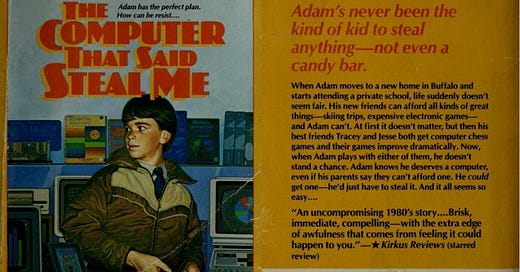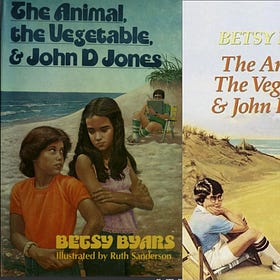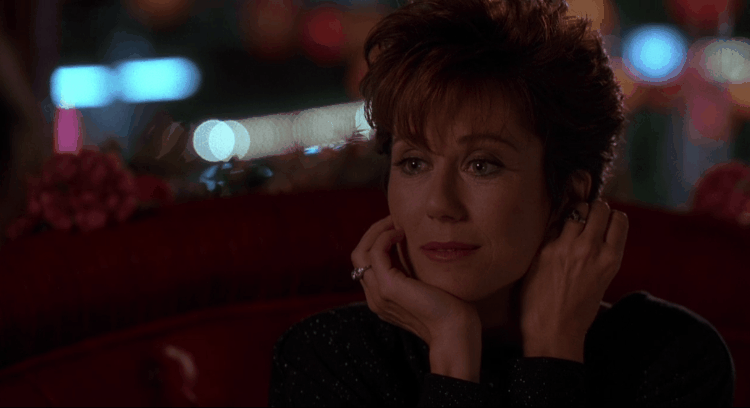I wrote this back in 2020 at Bookshelves of Doom, but as I’m on an Elizabeth Levy kick at the moment and it is such an absolutely bananas book, I’m re-running it here for folks who haven’t been exposed to ole Adam and his ill-gotten chess computer.
Oh my god.
I don’t even know where to start.
First up, this book is by Elizabeth Levy, the author of my beloved Something Queer/Fletcher mysteries.
The Computer That Said Steal Me, though, is very very different.
It’s about a sixth-grade incel—instead of sex, he lusts after an expensive chess computer, but his musings about and treatment of his best friend Tracey suggest that he’ll be an incel for real in a few years—named Adam.
(Get ready, by the way, to read the words “chess computer” approximately one million times. It’s like that I Robot, You Jane episode of Buffy where they won’t stop saying “e-letter”.)
Dispatches from the 80s #3
Clara sat in the backseat of the Mercedes, staring out the window. In the front seat her father and sister had been having a discussion about television for twenty miles. —The Animal, the Vegetable, and John D Jones, by Betsy Byars
So, the crux of this one is that he wants this dumb chess computer, but his parents won’t buy it for him. His parents are both teachers who go to nuclear disarmament rallies in their spare time—Adam, like so many kids in ‘80s chapter books, even has to babysit his baby sister for FREE because families help each other out, etc., etc. Long story short, they aren’t particularly affluent—in Adam’s mind, compared to his friends at school, they’re basically poor—and they’re not at all interested in shelling out $400 for a chess computer.
But let’s go back to Adam’s Incel Tendencies.
Exhibit A: After two pages largely about how great Tracey is, she beats Adam at chess and then he decides the only reason she beat him is because she owns a chess computer and ALSO THIS:
Tracey stood up. She was just as tall as Adam and just as skinny. She certainly didn’t look like a brain. She was the best-looking girl in the Math-Science Club, and Adam thought she had been elected president half on her looks.
Exhibit B: This isn’t about Tracey, but boy oh boy it still supports my point:
Adam looked down at the machine. He wanted a chess computer, but he didn’t want a hand-me-down. He wanted the one that talked, too. It didn’t seem fair that Tracey and Jesse could have anything they wanted and he couldn’t. He was the best player of the three of them. He was the one who had the right to the best chess computer. But since he’d already asked his parents for one, he knew they couldn’t afford it. It seemed that everything Adam wanted, they could not afford.
Exhibit C: Just, WOW:
Tiffany and Jesse stared down at the graph paper, as if wishing they were somewhere else. Adam felt furious, so angry that he actually did feel like slapping Tracey. He wanted to kill her. “Why?” he shouted. “Why am I so different?” he was screaming.
“Because you used to be nice!” shouted Tracey at the top of her lungs.
“Terrific,” said Adam, lowering his voice. He felt defeated. “Let’s hear it for nice. I can just see it on my tombstone. ‘He was a nice boy.’”
It’s hard, because on one hand, I truly understand Adam and his feelings about being the Poor Kid in his friend group… but on the other, at one point he literally compares his guilty feelings about stealing the chess computer to HIROSHIMA SURVIVORS’ GUILT. So it’s difficult to feel ALL that bad for him. Because OMG.
There’s other eyebrow-raising gender stuff, like when Adam chats with the lady at the electronics store and she’s all Not Like Other Girls-y because she’s good at chess:
Adam put down the pawn. “Thank you very much,” he said. “But I don’t think my sister is interested. She’s a lousy chess player.” Adam tried hard to keep from laughing at Tracey made a face at him.
“Very few girls are good,” said the saleslady. “I am.”
And this bit just depressed me—probably because it’s so accurate about the mindset:
Adam was still angry that evening when Melanie Vickers came to the door. Adam had seen her around school. She was short and just a little pudgy, but she had the biggest boobs in the ninth grade. Adam could imagine the jokes would make if he found out she had baby-sat for him. He hoped Jesse would never find out.
ANYWAY. So Adam comes up with the most absurdly convoluted plan to steal the chess computer—he makes a tape recording of a threatening message, steals a combination clock radio/tape deck, RETURNS the clock with the tape in it set to play the next day, then when the message plays and the store clerk has followed the instructions and locked herself in the bathroom, he’ll swan into the store and steal the chess computer.
WHAT COULD GO WRONG, AMIRITE??
But, see, it’s even MORE convoluted because he’s worried that the lady will recognize his voice on the tape, so he sets up shop in a different part of the mall and gets a zillion different people to say one word each into his tape recorder—kind of like that scene in Sneakers when Mary McDonnell gets Stephen Tobolowsky to say My voice is my passport. Verify me. over the course of an interminable date, but I digress—as if the whole HE RETURNED THE CLOCK RADIO RIGHT BEFORE IT STARTED SPEWING THREATENING MESSAGES thing wouldn’t be suspicious, but whatever.
But it all works out and he steals the chess computer, and then it’s basically The Tell-Tale Heart because he can’t even play with it without feeling horrible and scared and guilty.
Amazingly, he doesn’t even steal the chess computer until two-thirds of the way through the book! He spends probably three-quarters of the book feeling guilty about it—he’s guilty before he even STARTS actively working towards the theft—and then AFTER he steals it, the spiraling anxiety is… hilarious but not inaccurate?
What if he fell under the wheels of one of the cars? The police would find the crushed chess computer under is broken body. His parents would know he was a thief. But he would be dead, he wouldn’t have to worry about it.
It continues, giving us an I’m Not Sure We’d See This In 2020 Middle Grade moment (TW: suicide):
Adam realized that he didn’t have to wait for an accident to happen. He could throw himself under one of the cars. His breath came in gasps. He had never thought about suicide before. He saw himself bloody under a car’s wheels. He wondered whether the silicon microchips in the Chess Challenge would survive. Maybe the voice in the machine would keep going, eerily chanting out, “Knight to bishop three.” The computer’s voice would live, but Adam’s own voice would be stilled forever.
I… WOW.
There’s a moment where Adam almost comes clean to his father, but when he tests the waters, his father goes on a multi-page tirade about how terrible stealing is and says, QUOTE, “I hate kids who steal.” So obviously Adam doesn’t confess.
When everything eventually goes down and Adam returns the chess computer to the store, it is AWESOME because the clerk ABSOLUTELY DOES NOT forgive him, she has a total Rage Blackout and bonus, she calls him PERVERTED and suggests that he gets off on stealing things and then bringing them back. I genuinely laughed out loud when I hit this line:
Of all the things that Adam had expected to happen when he confessed, he never imagined Vanessa kicking him out of the store.
LIKE WHAT DID HE EXPECT? FOR HER TO BE GRATEFUL? Amazing.
MEANWHILE, there’s this whole subplot about the Math-Science Club putting together a school-wide D&D scenario, except it’s about nuclear war, so literally everyone dies, it’s just a matter of how fast. Like, there are details about one-megaton bombs versus twenty-megaton bombs, and how they’d affect human bodies, etc., etc. So that’s pleasant.
Points for showing how angry kids can be under the surface, and how scared. And for featuring a largely unlikable main character who has a lot of selfish and ugly-but-REALISTIC thoughts—though I also think Adam’s unlikability is more about my 2020 lens than it is about him being deliberately written as unlikable. As always, I love that so many kids’ books from this era include weird “adult conversations” that are clearly not designed to be intelligible to the actual readership, but are still realistic to their lives? Because kids are always overhearing adults talking, and oftentimes they pick up the tenor and gist of the conversation, but not the shades and nuances.
Conversations I can’t imagine taking place in a contemporary book about sixth graders:
ANDY GIBB OMG:
“If you thought the end of the world was coming, what would you do?” asked Adam.
Tracey thought. “Go find Andy Gibb,” she said finally.
“Seriously,” said Adam.
“Well, I’d hate to die a virgin, but I’m too young, so I think I’d just like to die in Andy Gibb’s arms. What would you do?”
PORNO FLICK OMG WHAT:
Chuckie winked back as if he understood. He gave the girl one of the most charming smiles Adam had ever seen. Adam knew that he could be charming when he needed to be, but watching Chuckie made him feel like an amateur.
“I hope this isn’t going to be used for the soundtrack for a porno flick,” asked the girl.
Other random notes:
Adam pulls the Stick Your Sleeping Friend’s Hand in a Bowl of Warm Water move on his friend Jesse, which leads to a Blackmail Plot.
There’s a thread about how Jesse’s mom used to go out with Adam’s dad, and there’s a scene where she is LEGIT HITTING ON HIM and he’s just BACKING AWAY SLOWLY and keeps saying MY WIFE THIS and MY WIFE THAT and it is so cringey and awful and hilarious.
A kid drops the r-word, which is always jarring, but the matter-of-factness of the way it gets used in this case makes it even more so than usual.







This is hilarious. Thanks!
Just reading this kid's characterization makes me twitch. People really seemed to lean IN on the unlikeable character in the 70's and early 80's, didn't they? I mean, we culturally embraced unpleasantness to such an extent that we got Garbage Pail Kids, Dynasty slap-fights, "greed is good" shoulder pads and narrow ties with a side of self-absorption, as we let people die of AIDS and shrugged that it was justified. Of course, historically children's lit is generally ten years behind the actual cultural zeitgeist of adulthood but they still managed this time to be pretty close, which I find fascinating.
Also, 10 years from now, I wonder if we'll look back and be able to see any hint of what the adults were thinking in children's literature. Do we see as many angry Kids? As many ugly themes? I think we see a desperate focus on being kind and clever and self sufficient. We know our poor kids have to figure ish out on their own...